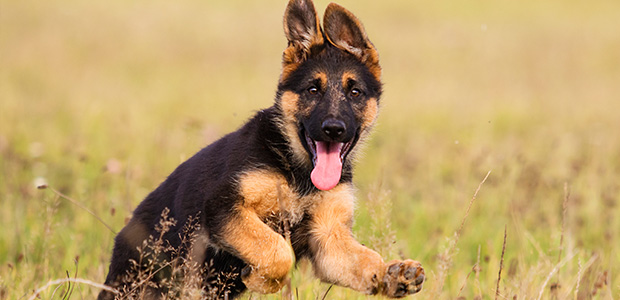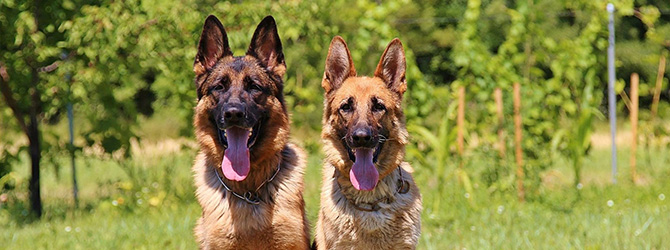The German Shepherd: thinking about getting a German Shepherd?
First Published: 17/12/2019
Last Updated: 20/01/2025
Champion tricksters, exercise gurus and about as loyal as it’s possible to be, it’s no wonder the German Shepherd is one of the most popular dog breeds in the UK!
Let’s take a closer look at the German Shepherd.
Place of origin: Northwest Europe, adapted from ‘Continental Shepherd’ in around 1890
How big do German Shepherds get? 55 – 65cm
How heavy are German Shepherds? 22 – 40kg
German Shepherd Life Expectancy: 9 – 13 years
Colour: Black, Black & Tan, Red & Black, Sable, Grey, Black & Silver
Please note: A dog’s exercise, training/stimulation and grooming requirements can depend on several factors such as age and health. The same goes for ongoing costs of ownership. For advice on one specific dog, we always advise chatting with a vet.
How much exercise does a German Shepherd need?
German Shepherds have plenty of energy to burn. Their need for exercise makes them well suited for individuals, couples and families who lead an active lifestyle and have plenty of space for them to run around in – ideally in the form of a large garden.
An adult German Shepherd will need 2 lengthy walks every day, along with mental stimulation to stop them getting bored…
Training: how to train a German Shepherd
There’s a reason German Shepherds are used by the police – and it’s not just their loyalty. They make excellent rescue and tracking dogs because they’re highly intelligent and respond well to mental stimulation and training.
German Shepherds are often happiest when they know what’s expected of them; with clear boundaries and a routine that’s ever-changing and fun, you should find your German Shepherd a delight to train. If you’re looking for a breed that’ll perform well in agility classes, a German Shepherd may be just the one.
That said, if you’re happy to provide the minimum training required but don’t like the idea of regular games and exercise, it’s probably best that you consider a different breed.

Grooming: do German Shepherds shed?
German shepherds moult continuously, especially during moulting season. To keep their coat in tip-top condition, we recommend brushing them 2 or 3 times a week. They’re fairly big dogs so if you plan to bathe your German Shepherd, you may need the help of a professional groomer.
As with all breeds, complete your German Shepherd’s grooming routine with regular tooth brushing, nail clips and ear checks.
German Shepherd temperament, socialising and ideal home environment
If you’re looking for a breed that’ll learn a hatful of tricks, look no further than a German Shepherd! Typically, German Shepherds are loyal, loving companions and form close bonds with their owners. They’re a perfect match for active individuals/families who love the great outdoors and playing games.
If you’re indecisive about long walks and training, we recommend you choose a breed with a more laidback nature and gentler exercise needs.
German Shepherds are fairly vocal dogs too. This is nothing some reward-based training at a young age won’t sort out, but do be advised they’re not the best fit for younger, excitable children.
Cost of owning a German Shepherd
When considering the lifetime cost of owning a German Shepherd, remember to take into account:
- Breed-specific food
- Veterinary care
- Pet insurance
- Kennels or dog sitters
- Grooming costs
- Toys and equipment
- Preventative healthcare
As a rough guide, allow between £100 and £150 a month to cover the ongoing costs of owning a German Shepherd. Our vets have drawn up this handy guide to save dog owners money.
Need more info?
For more info on finding the best dog breed for you and your lifestyle, have a chat with your vet.
Find your nearest vet using our Find a Vet page, or speak to a vet online using Online Vets.
